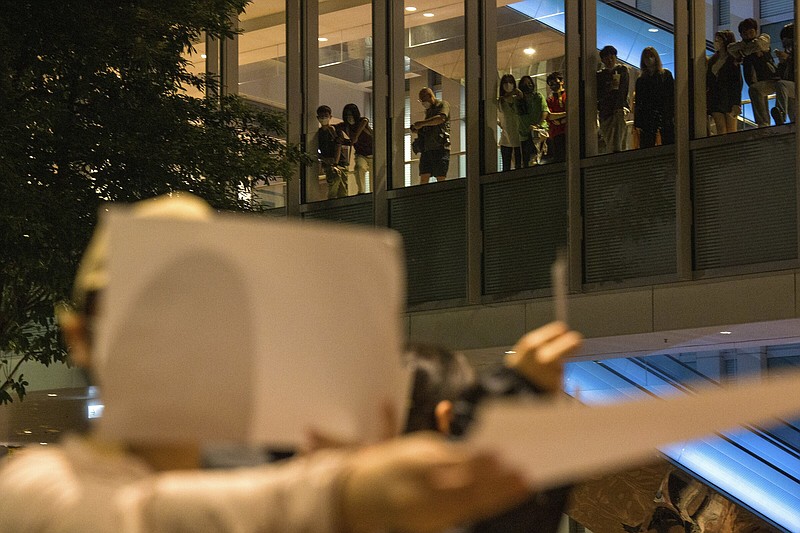BEIJING -- Chinese universities sent students home and police fanned out in Beijing and Shanghai to prevent more protests Tuesday after crowds angered by severe anti-virus restrictions called for leader Xi Jinping to resign.
Authorities have eased some controls after demonstrations in at least eight mainland cities and Hong Kong but maintained they would stick to a "zero-covid" strategy that has confined millions of people to their homes for months at a time. Security forces have detained an unknown number of people and stepped up surveillance.
With police out in force, there was no word of protests Tuesday in Beijing, Shanghai or other major mainland cities. In Hong Kong, about a dozen people, mostly from the mainland, protested at a university.
Videos and posts on Chinese social media about protests were deleted by the ruling party's vast online censorship apparatus.
There were no announcements about detentions, though reporters saw protesters taken away by police, and authorities warned some detained protesters against demonstrating again.
One person who lived near a protest site in Shanghai was detained Sunday and held until Tuesday morning, according to two friends who insisted on anonymity for fear of retribution from authorities.
On Tuesday, protesters at the University of Hong Kong chanted against virus restrictions and held up sheets of paper with critical slogans. Some spectators joined in their chants.
"Zero covid" has helped keep case numbers lower than those of the United States and other major countries, but global health experts increasingly say it is unsustainable.
At least 10 universities have sent students home. Schools said classes and final exams would be conducted online. The schools said they were being protected from covid-19, but dispersing them to far-flung hometowns also reduces the likelihood of more demonstrations.
Authorities hope to "defuse the situation" by clearing out campuses, said Dali Yang, an expert on Chinese politics at the University of Chicago. Depending on how tough a position the government takes, groups might take turns protesting, he said.
Beijing needs to make its approach to covid-19 "very targeted" to reduce economic disruption, the head of the International Monetary Fund told The Associated Press Tuesday.
"We see the importance of moving away from massive lockdowns," Managing Director Kristalina Georgieva said in Berlin. "So that targeting allows to contain the spread of covid without significant economic costs."
Economists and health experts, however, warn that Beijing can't relax controls that keep most travelers out of China until tens of millions of elderly people are vaccinated. They say that means "zero covid" might not end for as much as another year.
The National Health Commission announced Tuesday plans to encourage the elderly to be vaccinated with publicity campaigns, outreach through community centers and mobile vaccination sites to reach people who can't leave home.
Sympathy protests were held overseas and foreign governments have called on Beijing for restraint.
"We support the right of people everywhere to peacefully protest, to make known their views, their concerns, their frustrations," said U.S. Secretary of State Antony Blinken during a visit to Bucharest, Romania.
Meanwhile, the British government summoned China's ambassador as individuals protest over the arrest and beating of a BBC cameraman in Shanghai.
Media freedom "is something very, very much at the heart of the U.K.'s belief system," said Foreign Secretary James Cleverly.
Chinese Ministry of Foreign Affairs spokesperson Zhao Lijian disputed the British version of events. Zhao said the journalist, Edward Lawrence, failed to identify himself and accused the BBC of twisting the story.
Information for this article was contributed by Kanis Leung, Jill Lawless, David McHugh and Ellen Knickmeyer.
